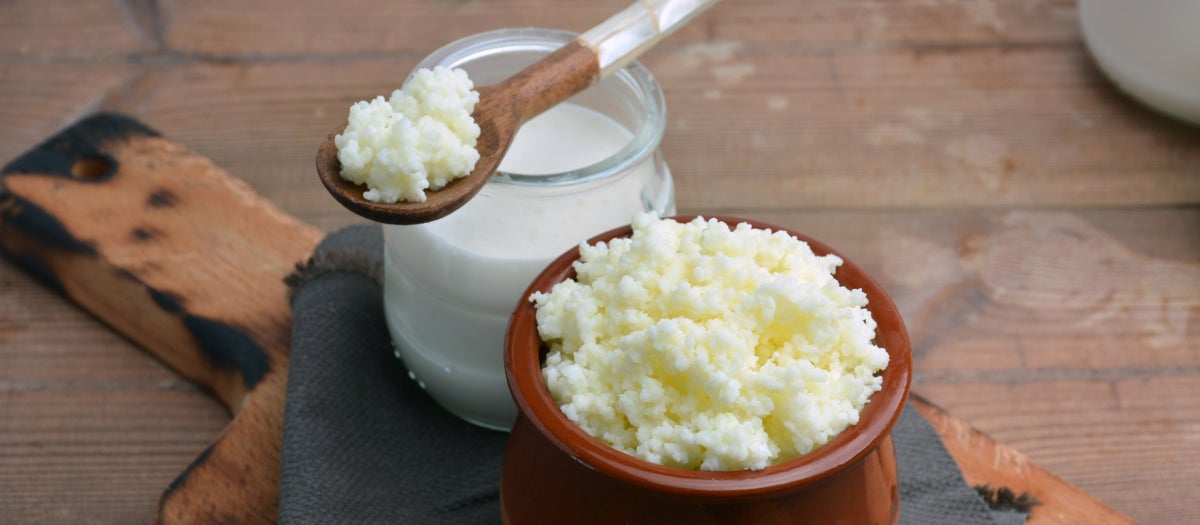Bifidobakterien
Gute Bakterien für deinen Darm
Unser Darm ist ein hochkomplexes System mit etwa 100 Billionen wohlwollenden Mitbewohnern, die unsere Verdauung fördern. Einer der häufigsten Mikroorganismen: Bifidobakterien. Das Milchsäurebakterium ist ein echter Tausendsassa für die Gesundheit und wichtig für eine ausgeglichene Darmflora.

Bifidobakterien sind in Sauermilchprodukten enthalten und unterstützen eine gesunde Darmflora.
Unser Darm ist ein hochkomplexes System mit etwa 100 Billionen wohlwollenden Mitbewohnern, die unsere Verdauung fördern. Einer der häufigsten Mikroorganismen: Bifidobakterien. Das Milchsäurebakterium ist ein echter Tausendsassa für die Gesundheit und wichtig für eine ausgeglichene Darmflora.
Bifidobakterien sind – wie die Lactobacillen – Milchsäurebakterien, die im Gegensatz zu schädlichen Mikroorganismen, viele gesundheitsfördernde Eigenschaften besitzen. Beide Vertreter dieser „guten“ Bakterien kommen in unserem Darm am häufigsten vor. Auch in einigen Lebensmitteln fühlen sich die kleinen Helfer wohl: Wie der Name schon verrät, sind Milchsäurebakterien vor allem in Sauermilchprodukten wie Joghurt, Quark, Buttermilch und Kefir anzutreffen. Aber auch in einigen pflanzlichen Speisen wie frischem Sauerkraut und Kimchi. Der tägliche Verzehr milchsäurebakterienhaltiger Lebensmittel unterstützt eine Besiedelung mit „guten“ Bakterien in unserem Darm.
Mindestens genauso wichtig: das richtige Futter für die kleinen Mitbewohner. Und da stehen durchaus spezielle Wünsche auf der Liste der Lieblingsspeisen. Besondere Leckerbissen sind Pflanzenzucker wie Fructo- und Galactooligosaccharide. Diese werden auch als Präbiotika bezeichnet, da sie eine besonders gute Nahrungs- und Energiequelle für unsere nützlichen Darmbakterien sind. Aber auch Ballaststoffe, die in vielen pflanzlichen Lebensmitteln stecken, stehen auf dem Speiseplan von Bifidobakterien und seinen Geschwistern ganz oben. Insgesamt gilt eine Kost mit hohem Anteil an Obst, Gemüse, Vollkornprodukten, Hülsenfrüchten und fermentierten Lebensmitteln als darmgesunde Ernährung.
Gut zu wissen
Seit langem kein Geheimnis: Gute Darmbakterien wie Bifidobakterien und Lactobacillen spielen eine wichtige Rolle für die Verdauung und unsere Darmgesundheit. Neuere Forschungsergebnisse zeigen sogar, dass Darmbakterien und die von ihnen hergestellten Substanzen zusätzlich noch viel weitreichendere Gesundheitseffekte haben. So können bestimmte Bifidobakterien und Lactobacillen eine Auswirkung auf unseren Fett- und Zuckerstoffwechsel und die Körpergewichtsregulation haben. Mehr noch: Auch ein Zusammenhang mit der körperlichen und geistigen Fitness ist untersucht worden.
1. Hibberd, A., et al., Probiotic or synbiotic alters the gut microbiota and metabolism in a randomised controlled trial of weight management in overweight adults. Beneficial Microbes, 2019. 10(2): p. 121-135.
2. Chang, L. and N. Patno, Probiotic Strain B420 Increases Akkermansia muciniphila in Humans.
3. Stenman, L., et al., Potential probiotic Bifidobacterium animalis ssp. lactis 420 prevents weight gain and glucose intolerance in diet-induced obese mice. Beneficial microbes, 2014. 5(4): p. 437-445.
4. Stenman, L.K., et al., Probiotic with or without fiber controls body fat mass, associated with serum zonulin, in overweight and obese adults—randomized controlled trial. EBioMedicine, 2016. 13: p. 190-200.
5. Uusitupa, H.-M., et al., Bifidobacterium animalis subsp. lactis 420 for Metabolic Health: Review of the Research. Nutrients, 2020. 12(4): p. 892.
6. Ridaura, V.K., et al., Gut microbiota from twins discordant for obesity modulate metabolism in mice. Science, 2013. 341(6150): p. 1241214.
7. Amar, J., et al., Intestinal mucosal adherence and translocation of commensal bacteria at the early onset of type 2 diabetes: molecular mechanisms and probiotic treatment. EMBO molecular medicine, 2011. 3(9): p. 559-572.
8. Putaala, H., et al., Effect of four probiotic strains and Escherichia coli O157: H7 on tight junction integrity and cyclo-oxygenase expression. Research in microbiology, 2008. 159(9-10): p. 692-698.
9. Andrade, S. and N. Borges, Effect of fermented milk containing Lactobacillus acidophilus and Bifidobacterium longum on plasma lipids of women with normal or moderately elevated cholesterol. Journal of dairy research, 2009. 76(4): p. 469-474.
10. Ruscica, M., et al., Nutraceutical approach for the management of cardiovascular risk–a combination containing the probiotic Bifidobacterium longum BB536 and red yeast rice extract: results from a randomized, double-blind, placebo-controlled study. Nutrition journal, 2019. 18(1): p. 1-9.
11. Cicolari, S., et al., Interactions of oxysterols with atherosclerosis biomarkers in subjects with moderate hypercholesterolemia and effects of a nutraceutical combination (Bifidobacterium longum BB536, red yeast rice extract)(randomized, double-blind, placebo-controlled study). Nutrients, 2021. 13(2): p. 427.
12. Sun, C., et al., Targets of statins intervention in LDL-C metabolism: Gut microbiota. Frontiers in Cardiovascular Medicine, 2022. 9: p. 972603.
13. Canani, R.B., et al., Potential beneficial effects of butyrate in intestinal and extraintestinal diseases. World journal of gastroenterology: WJG, 2011. 17(12): p. 1519.
14. Zhang, H., et al., Effect of fermented milk on upper respiratory tract infection in adults who lived in the haze area of Northern China: A randomized clinical trial. Pharmaceutical Biology, 2021. 59(1): p. 645-650.
15. West, N.P., et al., Probiotic supplementation for respiratory and gastrointestinal illness symptoms in healthy physically active individuals. Clinical Nutrition, 2014. 33(4): p. 581-587.
16. Latvala, S., et al. The effect of probiotic Bifidobacterium lactis Bl-04 on host antiviral responses in vitro. in EUROPEAN JOURNAL OF IMMUNOLOGY. 2019. WILEY 111 RIVER ST, HOBOKEN 07030-5774, NJ USA.
17. Klemenak, M., et al., Administration of Bifidobacterium breve Decreases the Production of TNF-α in Children with Celiac Disease. Digestive diseases and sciences, 2015. 60: p. 3386-3392.
18. Quagliariello, A., et al., Effect of Bifidobacterium breve on the intestinal microbiota of coeliac children on a gluten free diet: a pilot study. Nutrients, 2016. 8(10): p. 660.
19. Solito, A., et al., Supplementation with Bifidobacterium breve BR03 and B632 strains improved insulin sensitivity in children and adolescents with obesity in a cross-over, randomized double-blind placebo-controlled trial. Clinical Nutrition, 2021. 40(7): p. 4585-4594.
20. Solito, A., et al. Supplementation with Bifidobacterium breve BR03 and Bifidobacterium breve B632 favoured weight loss and improved insulin metabolism in children and adolobesity in the BIFI-OBESE cross-over, randomized placebo-controlled trial. in Endocrine Abstracts. 2020. Bioscientifica.
21. Del Piano, M., et al., The use of probiotics in healthy volunteers with evacuation disorders and hard stools: a double-blind, randomized, placebo-controlled study. Journal of clinical gastroenterology, 2010. 44: p. S30-S34.
22. Díaz-Jiménez, J., et al., Impact of probiotics on the performance of endurance athletes: A systematic review. International Journal of Environmental Research and Public Health, 2021. 18(21): p. 11576.
23. Gill, H.S., et al., Enhancement of immunity in the elderly by dietary supplementation with the probiotic Bifidobacterium lactis HN019. The American journal of clinical nutrition, 2001. 74(6): p. 833-839.
24. Miller, L.E., L. Lehtoranta, and M.J. Lehtinen, The effect of Bifidobacterium animalis ssp. lactis HN019 on cellular immune function in healthy elderly subjects: systematic review and meta-analysis. Nutrients, 2017. 9(3): p. 191.
25. Cheng, J., A. Laitila, and A.C. Ouwehand, Bifidobacterium animalis subsp. lactis HN019 effects on gut health: A review. Frontiers in Nutrition, 2021. 8: p. 790561.
26. Ibarra, A., et al., Effects of 28-day Bifidobacterium animalis subsp. lactis HN019 supplementation on colonic transit time and gastrointestinal symptoms in adults with functional constipation: a double-blind, randomized, placebo-controlled, and dose-ranging trial. Gut Microbes, 2018. 9(3): p. 236-251.
27. Waller, P.A., et al., Dose-response effect of Bifidobacterium lactis HN019 on whole gut transit time and functional gastrointestinal symptoms in adults. Scandinavian journal of gastroenterology, 2011. 46(9): p. 1057-1064.
28. Bernini, L.J., et al., Beneficial effects of Bifidobacterium lactis on lipid profile and cytokines in patients with metabolic syndrome: A randomized trial. Effects of probiotics on metabolic syndrome. Nutrition, 2016. 32(6): p. 716-719.
29. Sanders, M.E., Summary of probiotic activities of Bifidobacterium lactis HN019. Journal of clinical gastroenterology, 2006. 40(9): p. 776-783.
30. Giannetti, E., et al., A mixture of 3 bifidobacteria decreases abdominal pain and improves the quality of life in children with irritable bowel syndrome. Journal of Clinical Gastroenterology, 2017. 51(1): p. e5-e10.
31. Ma, Z., et al., Bifidobacterium infantis M-63 improves mental health in victims with irritable bowel syndrome developed after a major flood disaster. Beneficial microbes, 2019. 10(2): p. 111-120.
32. Zhou, C., et al., Bifidobacterium longum alleviates irritable bowel syndrome-related visceral hypersensitivity and microbiota dysbiosis via Paneth cell regulation. Gut Microbes, 2020. 12(1): p. 1782156.
33. Järbrink-Sehgal, E. and A. Andreasson, The gut microbiota and mental health in adults. Current opinion in neurobiology, 2020. 62: p. 102-114.
34. Eriksson, A., Can Probiotics Reduce Anxiety Symptoms?: The Gut-Brain Axis And Well-Being. 2022.
35. Casertano, M., V. Fogliano, and D. Ercolini, Psychobiotics, gut microbiota and fermented foods can help preserving mental health. Food Research International, 2022. 152: p. 110892.
36. Howland, R.H., Vagus nerve stimulation. Current behavioral neuroscience reports, 2014. 1: p. 64-73.
37. Thongaram, T., et al., Human milk oligosaccharide consumption by probiotic and human-associated bifidobacteria and lactobacilli. Journal of dairy science, 2017. 100(10): p. 7825-7833.
38. Walsh, C., et al., Human milk oligosaccharide-sharing by a consortium of infant derived Bifidobacterium species. Scientific Reports, 2022. 12(1): p. 4143.
39. Inoue, T., et al., Effect of combined bifidobacteria supplementation and resistance training on cognitive function, body composition and bowel habits of healthy elderly subjects. Beneficial microbes, 2018. 9(6): p. 843-853.
40. Liu, N., et al., Probiotic supplements are effective in people with cognitive impairment: a meta-analysis of randomized controlled trials. Nutrition Reviews, 2023: p. nuac113.

